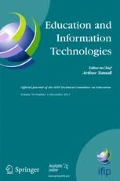Abstract
Teachers’ self-directed professional development (i.e., professional development implemented by teachers on their own) has been considered a useful channel of overcoming external constraints in under-resourced contexts, where external support for teachers may be limited. However, almost no research has focused on how such development could be achieved through open educational resources (OERs), which have been acknowledged for their free and convenient access and for their complementary role in buttressing the instructional content of in-class teaching. In response to this gap, this study adopted a qualitative case study approach that tracked a secondary teacher from an under-resourced vocational school in China and explored the trajectory of her self-directed professional development through OERs. Through qualitative analyses of data sources (e.g., the teacher’s reflections, interview responses and field notes on teaching activities), this study reveals that the teacher’s OER-based self-directed professional development involved a process of battling diverse factors in and outside the classroom, including her prior expectations of OERs and the vicarious teaching experiences that she gained while implementing self-directed professional development. The teacher gradually constructed her malleable and critical understanding of OERs as crucial resources in sustaining her self-directed professional development. This study concludes that OERs were useful in the process of the teacher’s self-directed professional development, despite the complexity of their use.
Similar content being viewed by others

Data Availability
The datasets used for the current study are not publicly available due to the need of protecting the participant’s personal privacy, but are available on reasonable request.
References
Beach, P. (2017). Self-directed online learning: A theoretical model for understanding elementary teachers’ online learning experiences. Teaching and Teacher Education, 61, 60–72
Beatty, B. R. (2000). Teachers leading their own professional growth: Self-directed reflection and collaboration and changes in perception of self and work in secondary school teachers. Journal of In-Service Education, 26(1), 73–97
Bhatt, S. P. (2021). Self-directed professional development: EFL teachers’ understanding. International Journal of Language and Literary Studies, 3(4), 196–208
Chappell, P., & Moore, S. (2012). Novice teachers and linguistics: Foregrounding the functional. TESOL Quarterly, 46(3), 589–598
Chiorescu, M. (2017). Exploring open educational resources for College Algebra. The International Review of Research in Open and Distributed Learning, 18(4), 50–58
Cirocki, A., & Farrell, T. S. (2019). Professional development of secondary school EFL teachers: Voices from Indonesia. System, 85, 102111
Curran, V., Gustafson, D. L., Simmons, K., Lannon, H., Wang, C., Garmsiri, M., Lee, F., & Wetsch, L. (2019). Adult learners’ perceptions of self-directed learning and digital technology usage in continuing professional education: An update for the digital age. Journal of Adult and Continuing Education, 25(1), 74–93
Donitsa-Schmidt, S., & Topaz, B. (2018). Massive open online courses as a knowledge base for teachers. Journal of Education for Teaching, 44(5), 608–620
Harman, R. (2018). Bilingual learners and social equity: Critical approaches to systemic functional linguistics. New York: Springer
Harman, R. M., & Zhang, X. (2015). Performance, performativity and second language identities: How can we know the actor from the act? Linguistics and Education, 32, 68–81
Hiver, P. (2013). The interplay of possible language teacher selves in professional development choices. Language Teaching Research, 17(2), 210–227
Junqueira, L., & Payant, C. (2015). “I just want to do it right, but it’s so hard”: A novice teacher’s written feedback, beliefs and practices. Journal of Second Language Writing, 27, 19–36
Louws, M. L., Meirink, J. A., Van Veen, K., & Van Driel, J. H. (2017). Teachers’ self-directed learning and teaching experience: What, how, and why teachers want to learn. Teaching and Teacher Education, 66, 171–183
Merriam, S. B., & Grenier, R. S. (Eds.). (2019). Qualitative research in practice: Examples for discussion and analysis. CA: Jossey-Bass
Mushayikwa, E., & Lubben, F. (2009). Self-directed professional development–Hope for teachers working in deprived environments? Teaching and Teacher Education, 25(3), 375–382
Shurr, J., Hirth, M., Jasper, A., McCollow, M., & Heroux, J. (2014). Another tool in the belt: Self-directed professional learning for teachers of students with moderate and severe disabilities. Physical Disabilities: Education and Related Services, 33(1), 17–38
Ushioda, E. (2016). Language learning motivation through a small lens: A research agenda. Language Teaching, 49(4), 564–577
Visser, R. D., Evering, L. C., & Barrett, D. E. (2014). #TwitterforTeachers: The implications of Twitter as a self-directed professional development tool for K–12 teachers. Journal of Research on Technology in Education, 46(4), 396–413
Wiley, D., & Hilton Iii, J. L. (2018). Defining OER-enabled pedagogy. The International Review of Research in Open and Distributed Learning, 19(4), 133–147
Wittmann, G. E., & Olivier, J. (2019). Professional development in fostering self-directed learning in German second additional language teachers. Per Linguam, 35(3), 125–142
Yada, A., Björn, P. M., Savolainen, P., Kyttälä, M., Aro, M., & Savolainen, H. (2021). Pre-service teachers’ self-efficacy in implementing inclusive practices and resilience in Finland. Teaching and Teacher Education, 105, 103398
Zhang, F., & Liu, Y. (2014). A study of secondary school English teachers’ beliefs in the context of curriculum reform in China. Language Teaching Research, 18(2), 187–204
Zhang, X. (2018a). Connecting OER with mandatory textbooks in an EFL classroom: A language theory–based material adoption. International Review of Research in Open and Distributed Learning, 19(2), 89–110
Zhang, X. (2018b). Mitigating suburban English writing teachers’ constrained professional development through distance education: One case study. The International Review of Research in Open and Distributed Learning, 19(5), 238–254
Zhang, X. (2020). Exploring English writing teachers’ self-development through the use of online resources in constrained contexts. Croatian Journal of Education, 22(1), 77–113
Zhang, X. (2021). Understanding reading teachers’ self-directed use of drama-based pedagogy in an under-resourced educational setting: A case study in China. Language Teaching Research, 13621688211012496
Author information
Authors and Affiliations
Corresponding author
Ethics declarations
Competing Interests
There is no conflict of interest.
Additional information
Publisher’s Note
Springer Nature remains neutral with regard to jurisdictional claims in published maps and institutional affiliations.
Rights and permissions
About this article
Cite this article
Zhang, X. Teachers’ self-directed professional development in under-resourced contexts: How do open educational resources matter?. Educ Inf Technol 28, 1849–1863 (2023). https://doi.org/10.1007/s10639-022-11238-7
Received:
Accepted:
Published:
Issue Date:
DOI: https://doi.org/10.1007/s10639-022-11238-7



